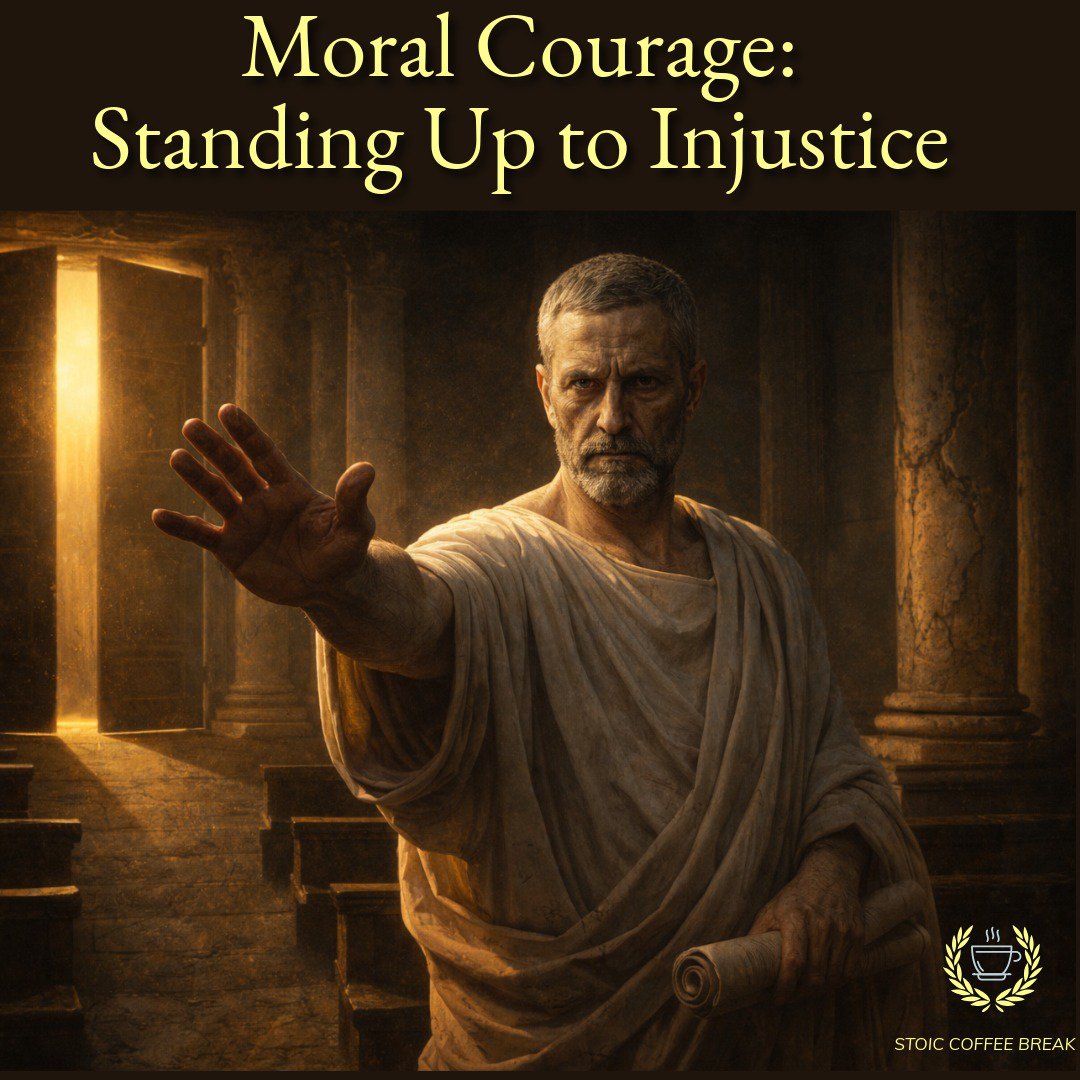
Are you a pessimist? Do you see the glass as half empty? Do you often get depressed when you think about the state of the world? Today I want to talk about how stoicism can help make you an optimist.
Very little is needed to make a happy life; it is all within yourself, in your way of thinking.
— Marcus Aurelius
Have you ever noticed how most of the movies about the future of mankind are usually post-apocalyptic? Meaning that they are generally about the end of the world, or at least the world as we know it. It’s easy to think about how things can go wrong. It’s easy to think about the things that can go wrong because there are more things that can go wrong than can go right. Being a pessimist is easy.
On the other hand, finding the way that things can go right takes perseverance and dedication. It takes a willingness to believe that things can go right. It takes effort. Working in software and working on complex interdependent systems, one of the things that most developers would agree on is the fact that getting things to work properly is hard. Breaking things is easy. Things not working is far easier than getting things to work the way that we want them to.
So the reason I brought this up is that often when we think about the future, we tend to take a dark view of where things are heading, and I think that it’s easy to develop a pessimistic view of where humanity is heading. I know that I have a tendency to do this, and I want to change my perspective because I think that it would serve me better for my daily happiness, and help me to make choices and take actions that could be more beneficial in the areas where I do have influence.
A few weeks ago I was listening to a podcast with Kevin Kelly. Now Kevin Kelly, among many other things, is the founder of Wired magazine, and has lived quite an interesting life. Rather than going off to college after high school, he wandered around Asia for 10 years. He’s written a sprawling sci-fi graphic novel, a book about vanishing cultures in China, and started the Long Now Society which is focused on developing long term policy for survival of the human race. Most recently he released a book that was all about the lessons he wished he’d known when he was younger.
But even with all this impressive stuff on his resume, there was something he said that really stuck with me. He talked about the fact that even with all the doom and gloom and challenges that are facing in the world, that he’s still very optimistic about the future. He said he wasn’t naive or blind to the challenges we face, but that he deliberately chooses to be an optimist. He said that it helps to make his every day life better, and that we as a society need people in this world that keep driving us forward with a better vision of the world.
He said that a big part of why he is an optimist is that we have as a species created lots of improbable things. The fact that we have created so many complex things that actually work is due to optimism. Complex things are improbable, meaning that complex things are more likely not to work, and the fact that we make them work and work well is pretty incredible. It says a lot for us as a species. It means that we can work together to create some pretty amazing stuff that makes life better for a large numbers of people.
He went on to make the argument that life is always going to have challenges and that there is simply no way to have a perfect world. Utopia is something that never will be possible. He framed his idea as “protopioa” which he defines as a culture where we recognize that life is full of challenges and that often there are trade offs for the solutions that we come up with. Often time those solutions create even more challenges, but even so, they are still worth it because the open up more options.
So why do I bring up all these things and how does stoicism fit in to all of this?
For me, this is a clear example of how choosing your perspective on life can make all the difference in the world. Because he specifically decides to view life through an optimistic lens, Kevin is able to see things in a way that supports his world view. He looks at the world around him, and find evidence that there are reasons to be optimistic, in spite of the challenges ahead.
It gave me pause. I started to think about if I would classify myself as an optimist or a pessimist. I realized that I’m clearly on the pessimistic side of the line, and that’s something that I would like to change. I know that much of it for me comes from my past and far too often I assume the worst will happen as a safety mechanism. If the worst happens, then I’m prepared for it.
So I started thinking about how I could work on changing that because I’d rather be hopeful about life and about humanity. Seeing the down side to everything leads you to that direction and you start seeing everything through that lens. I think it’s too easy to get lost in the dark.
So how does one develop a more optimistic outlook on life using stoic principles?
I think a lot of it comes with being able to reframe how you view the world. I think it also comes down to being aware of your thoughts, and making active choices to change how you want to view the world. It means that you choose to be an optimist, and for me there are a few principles that can help us be more optimistic.
Control
Stoicism focuses a lot on what we have control over, which allows us to actually have an impact on our lives. When we find ourselves in a challenging situation, when we can clearly delineate what is within our control and what is not, we can focus on what is within our power. This gives us control over some aspects of our life.
Epictetus makes it pretty clear that the only things that we really have control over are our thoughts, choices, and actions. In short, our will. We can choose what thoughts we think. We can make choices that are more beneficial for us and those around us. We may not be able to control the circumstances that we find ourselves in, but we can take actions that will help us in the long run.
For example, let’s say that you had some health issues and your doctor prescribed a diet that would help take care of those issue. In this case, you don’t have the power to just tell your body to heal itself. What you do have power over is how strictly you adhere to the diet that your doctor prescribed.
Responsibility
Related to control, we can take responsibility for our lives. When we own up to our choices and actions, we have the ability to shape our future. We refuse to blame others for the outcomes of our choices. The more responsibility we take, the more power we have in our lives. We make it so that we aren’t helpless.
When things happen that are out of our control, we step up and take responsibility for doing what we can to improve things. We don’t focus on who is to blame, but rather, we recognize that it is our responsibility to make things better. We could sit around hoping or even demanding that someone else fix things for us, but we’re much more likely to get what we want if we take responsibility for our own happiness.
When we stop up and take responsibility for ourselves and practice self control, the better we are able to handle future situations that might be even more challenging. Every time we step up, take responsibility and stretch ourselves to handle things outside of our comfort zone, the better we are able to handle harder and harder situations. But until we are able to step up and take responsibility, we will continually blame things outside of ourselves for why we’re unhappy and things aren’t going our way.
Change
The only constant in life is change. Embrace it, adapt to it, and let it transform you for the better.
— Epictetus
The stoics recognize that life is constantly changing and that we need to embrace change. The harder we resist changes in our life, that harder we make things for ourselves. When we see change and challenges as opportunities, we are able to embrace change with a sense of optimism that we’ll come out better on the other side.
Another aspect to consider and one that came to mind as I was listening to the podcast is to look at the challenges ahead as something that will give us ample opportunity to grow, then we will have to rise to the occasion to meet them. We will have to push ourselves, to expand our thinking of what’s possible, and find ways to work together in ways that we had never considered before. If we’re never challenged then we never really find out how good we can get. If we simply do the same easy things, then we never grow. We want those greater and greater challenges so that we can grow to be even better.
Gratitude
He who is not contented with what he has, would not be contented with what he would like to have.
— Socrates
The stoics teach us to be grateful and content with the things that we have. When we can be content with what have, then we don’t have to be continually striving for more in order to be happy. Now this may seem like a paradox, and it is. We need to be content with what we have, but always be looking to grow and move forward. We find in joy with appreciating what we have, and yet look forward to what’s ahead.
I think this is a profound lesson. If we can’t be happy and content with what we currently have, then when we get what we think we want, we still won’t be content and happy. By learning to want what we already have, we can be happy about things that already there. It’s an easy want to increase your happiness just by shifting your perspective, and is something that you can do at any moment.
Gratitude also helps us keep an open mind about things. I find that when I’m in a negative headspace that it is much harder to see that there are a lot more options to solving the problems that I’m dealing with. Gratitude and positivity is a choice, and it’s one that helps us widen our field of view rather than diminishing it.
Conclusion
So, are there areas in your life where you are take a dark view of things? Are there situations where you can reframe how you view things so that you see the good in even the darkest of situations? As with most aspects of stoicism, I think it’s important that we find a balance of being realistic, but also choosing how we want to view things. I don’t think we need to be naive about things and not see things as they are, but rather we can see things as they are and still choose to look at things through a more optimistic lens, and do our best to make a better future.
Hello friends! Thank you for listening. Stop by the website at stoic.coffee where you can sign up for our newsletter, and buy some great looking shirts and hoodies at the Stoic Coffee Shop.
Want to help support this podcast? Become a patron on patreon!
Like the theme song? You can find it here from my alter ego. 🙂
Find me on instagram or twitter.
Lastly if you know of someone that would benefit from or appreciate this podcast, please share it. Word of mouth is the best way to help this podcast grow.
Thanks again for listening.


